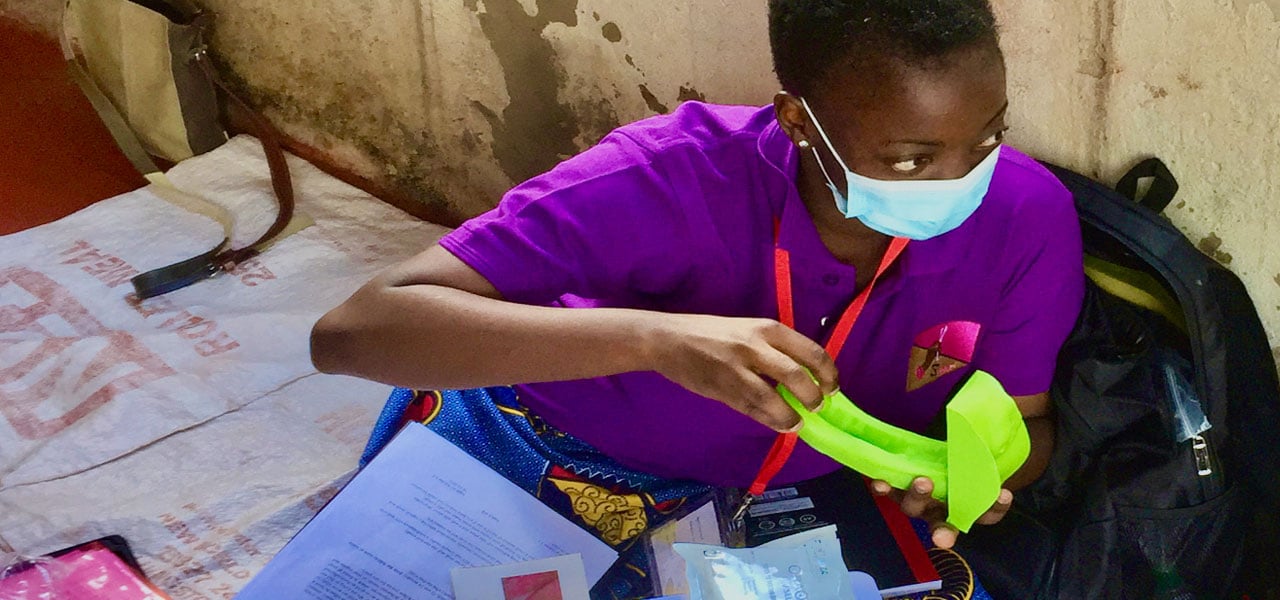
Schista Community Worker at a participant's home with the self-sampling portable mini lab. Credit: A.Bustinduy
Zipime Weka Schista! (Do self-testing sister!)
One-stop home self-sampling for female genital schistosomiasis, HPV, Trichomonas and HIV as a cost-effective and self-empowering strategy to increase case-detection and improve access to care for women of reproductive age in Zambia
The Zipime Weka Schista (Schista! for short) study aims to integrate female genital schistosomiasis, a neglected tropical gynecological disease, within the wider sexual and reproductive health screening strategies.
Integration of home self-sampling for the screening of female genital schistosomiasis with human papillomavirus (HPV) and self-testing for HIV and sexually transmitted infections is a cost-effective and self-empowering strategy that will increase the detection of cases and improve access to care for girls and women of reproductive age in sub-Saharan Africa.
Recent updates
The Zipime Weka Schista! study team recently gathered in Lusaka for an intensive two-day refresher training in preparation for the second follow-up phase.
Events
Newsletter
Contact us
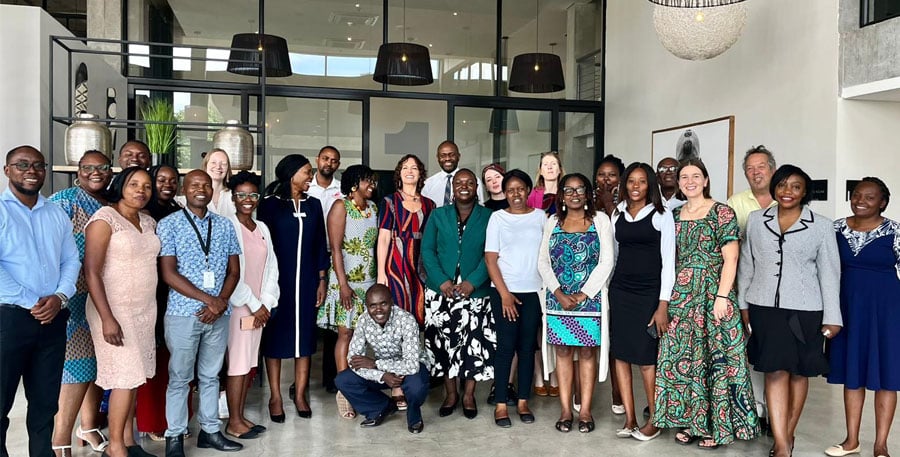
The Zipime Weka Schista! (Schista! for short) study brings together world-wide experts from the fields of female genital schistosomiasis, cervical cancer and HIV to propose an innovative approach to integrate multi-pathogen home-based self-sampling and testing.
Principal Investigator
Site Principal Investigator - Zambia
Study Manager
- Rhoda Ndubani
Co-investigators
- Bellington Vallika
- Helen Ayles
- Fern Terris-Presthold
- Helen Kelly
- Bonnie Webster
- Lisette Van Lieshout
- Govert Van Damm
- Paul Corstjens
- Philippe Mayaud
- Virginia Bond
PhD students
- Olimpia Lamberti - LSHTM/Nagasaki
- Bronwyn Neufeld - LSHTM/Nagasaki
- Lucy Smith - MRC LID
- Morgan Lemin - MRC LID
Recent updates
The Zipime Weka Schista! study team recently gathered in Lusaka for an intensive two-day refresher training in preparation for the second follow-up phase.
Events
Newsletter
Contact us
This study is designed as a holistic approach to FGS detection at-scale in the community and within the wider scope of female sexual and reproductive health surveillance and linkage to care in Zambia. Female genital schistosomiasis (FGS) causes substantial morbidity in the female genital tract. Home-based genital self-sampling procedures allow discrete and convenient testing for participants with difficulty accessing a medical facility. Extending the possibility of home-based sampling for S. haematobium would allow improved diagnosis and treatment of this important condition.
This study’s emphasis on home-based testing compared with clinic-based testing will evaluate an innovative approach for future expansion of surveillance of FGS using diagnostics with high feasibility for use at scale with a special emphasis on health economics to aim for sustainability.
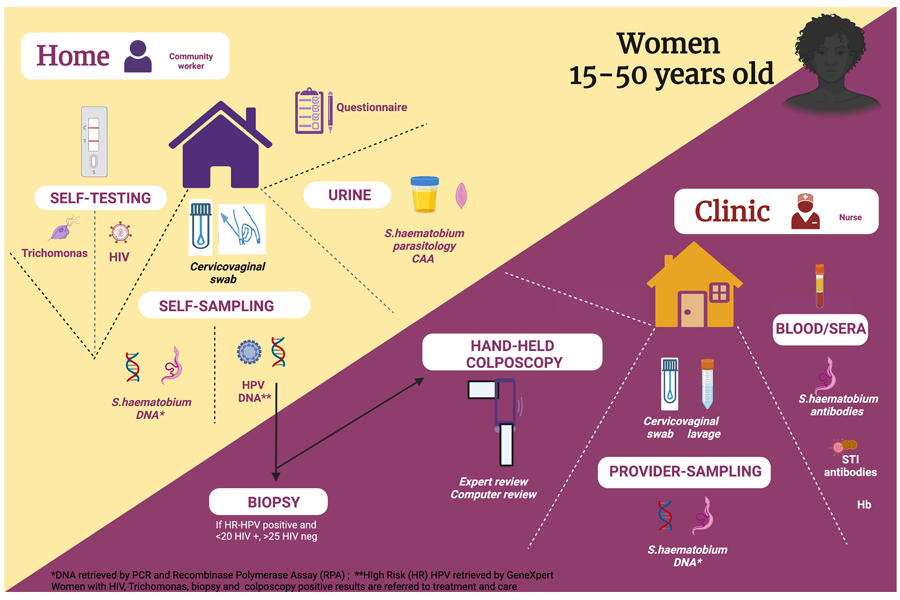
Recent updates
The Zipime Weka Schista! study team recently gathered in Lusaka for an intensive two-day refresher training in preparation for the second follow-up phase.
Events
Newsletter
Contact us
Read our publications from previous studies.
Recent updates
The Zipime Weka Schista! study team recently gathered in Lusaka for an intensive two-day refresher training in preparation for the second follow-up phase.
Events
Newsletter
Contact us
Schista! Sub-studies
Developing a multiplex, isothermal molecular diagnostic assay for FGS and HPV
Led by Lucy Smith (PhD Candidate)
Both female genital schistosomiasis (FGS) and human papillomaviruses (HPV) cause significant gynaecological morbidity in sub-Saharan Africa. Although high-resource molecular diagnostic methods exist, women in rural areas without access to medical clinics remain neglected. To address the lack of accessible diagnostics for women in rural areas, my project’s primary aim is to develop a multiplex, isothermal molecular diagnostic assay for both FGS and HPV.
My project is funded by the MRC LID DTP in collaboration with Professor Sanjeev Krishna at St. George’s University of London, and Doctor Bonnie Webster at the Natural History Museum.
Health economics analysis to evaluate the cost-effectiveness of FGS screening strategies, as part of the Zipime-Weka-Schista study in Zambia
Led by Olimpia Lamberti (PhD Candidate)
This economic evaluation aimed to Evaluate the cost-effectiveness of home-based self-sampling and clinic-based sampling for FGS screening compared to a no screening approach (the current standard of care) using a health decision analytical model. To address this, we developed a novel health decision analytical model (the FGS-SCREEN model) to evaluate the cost-effectiveness of different FGS screening strategies. The model was then implemented as part of the Zipime-Weka-Schista study to compare the cost-effectiveness of home-based self-sampling and clinic-based sampling to a no screening approach (current standard of care). Home-based self-sampling had a lower unit cost per woman screened compared to clinic-based sampling. Neither strategy was found to be very cost-effective if implemented individually. However, a combined screening pathway incorporating home-based self-sampling in rural (80% coverage of screening-eligible population) and clinic-based screening in peri-urban areas (20% coverage of screening eligible population) was found to be very cost-effective under conservative thresholds.
Applying computer vision to female genital schistosomiasis to improve visual diagnostics
Led by Morgan Lemin (PhD Candidate)
Visual diagnosis of FGS currently involves inspecting the cervix and surrounding tissue with a colposcope to identify one of the four classic lesion types (grainy sandy patches, homogenous sandy patches, abnormal vessels and rubbery papules). This method suffers from a lack of specificity and is highly subjective. However, in lieu of a gold standard molecular test, and with evidence that older women are more commonly test positive with visual diagnostics rather than molecular, work to improve visual diagnostics is warranted.
This work aims to apply computer vision, a form of machine learning, while developing clinical support tools to enhance visual diagnostics. It is funded through the MRC LID DTP, with the support and supervision of Prof Amaya Bustinduy and Dr Chrissy H Roberts.
Male genital schistosomiasis (MGS)
Male genital schistosomiasis (MGS) typically results from the entrapment of Schistosoma haematobium eggs in the male genital tract. There are no current and accurate estimates of the burden of MGS, due to disease underreporting primarily from diagnostic challenges and a lack of general awareness within the health system. We will recruit male household members of Zipime Weka Schista study participants in order to assess the prevalence of MGS across three communities in Zambia, investigate epidemiological risk factors, and examine clinical manifestations and morbidity associated with MGS.
The Zipime Weka Schista! study team recently gathered in Lusaka for an intensive two-day refresher training in preparation for the second follow-up phase. This hands-on workshop provided an opportunity for team members to collaborate, strategize, and refine their approach to ensure a smooth and effective follow-up process.
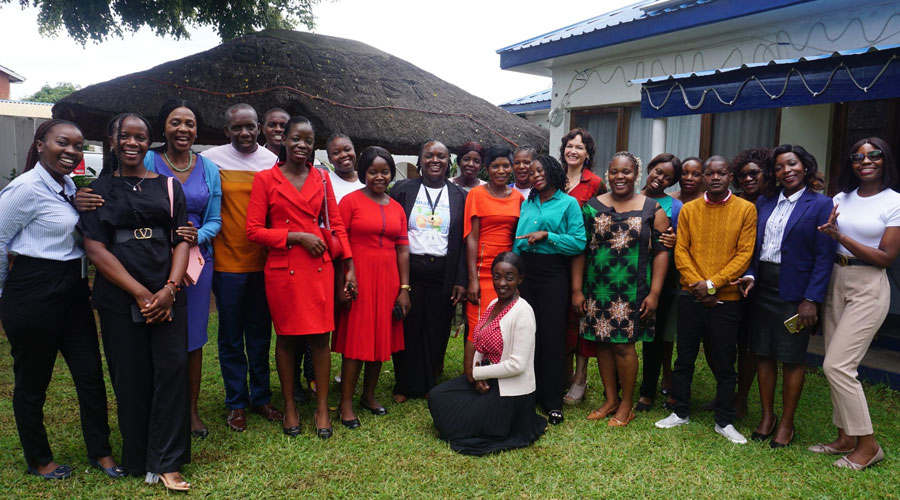
The session was very interactive, with participants actively contributing ideas and brainstorming strategies to enhance the next phase of the study. The team’s ongoing dedication and engagement are a key reason Schista’s continued success within the community.
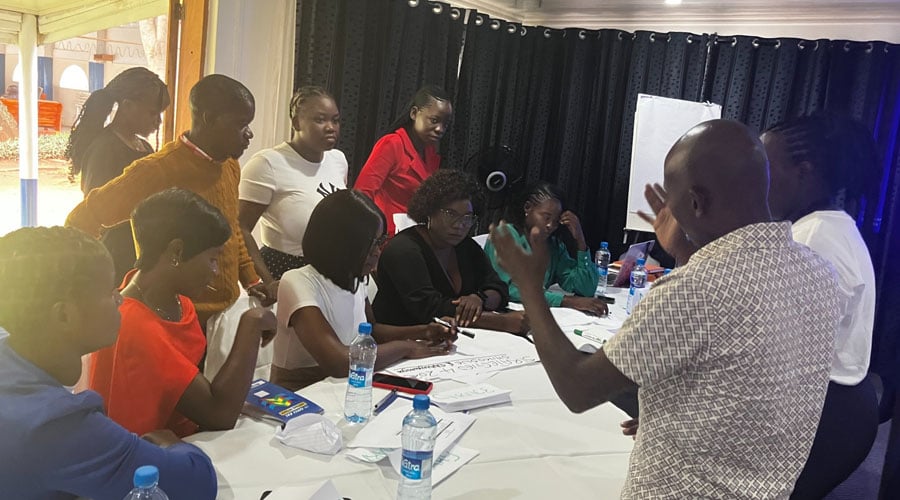
Now fully prepped, the team is now looking forward to re-engaging with the 2532 women enrolled in the study!
In October 2024, members of the Schista! team travelled to Zambia to deliver the baseline results to the community and stakeholders of the Zipime Weka Schista! Study. This follows successfully recruiting 2532 women. The first follow-up has already finished, with 1766 women who have given us their confidence and were seen again by our field and clinic teams.
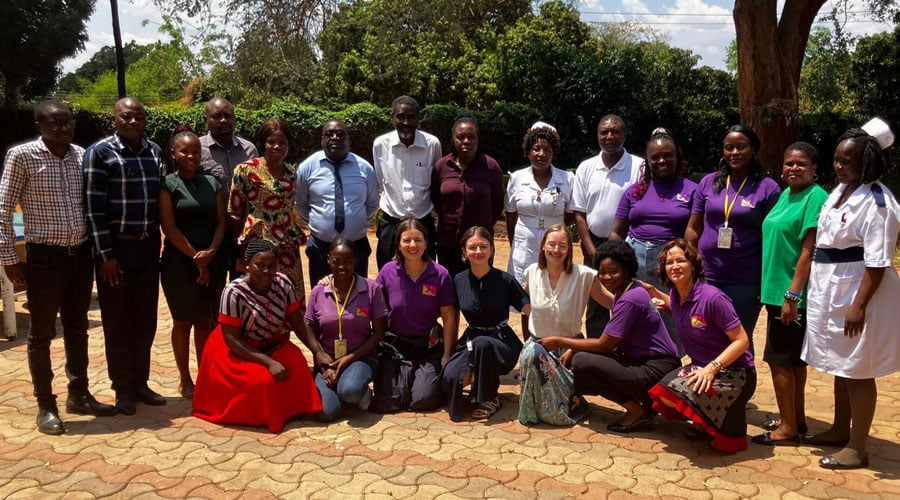
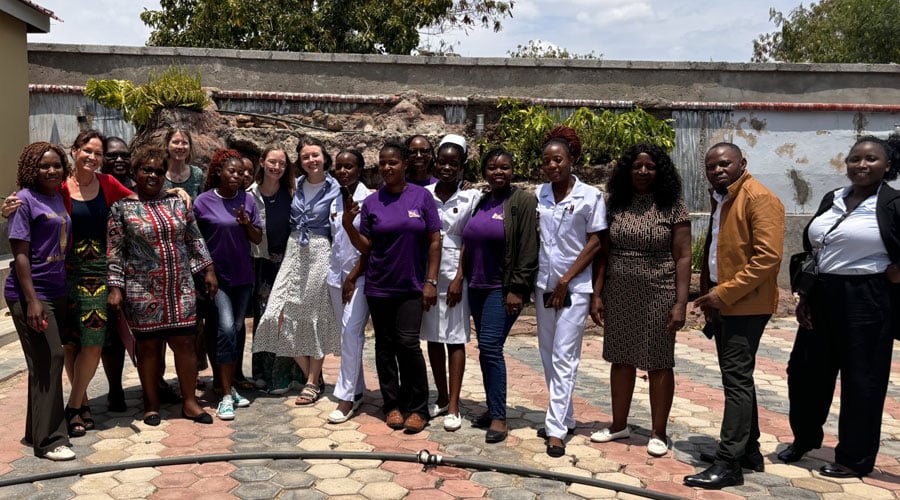
The Social Sciences team has also been busy conducting interviews with Schista! participants which focused on knowledge attitudes and perceptions on genital tract diseases including female genital schistosomiasis. The team has now completed 100 in-depth interviews and is in the process of transcribing them.
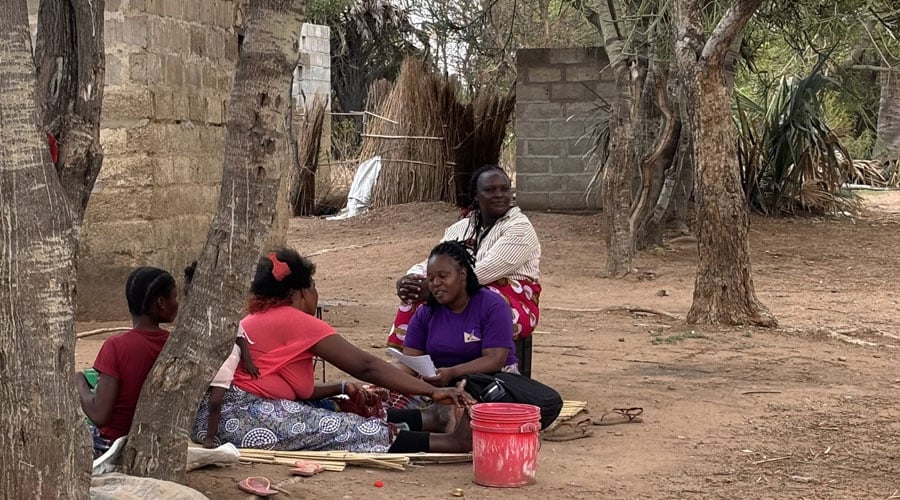
It was brilliant to catch up with our in-country collaborators at Zambart and experience the ongoing engagement and enthusiasm of the local community. Work is now gearing up for the next follow-up.
The BILGENSA (Genital Bilharzia in Southern Africa) research network had its inaugural hybrid meeting in Lusaka, Zambia on November 9th and 10th . 14 travel grants were awarded to delegates attending from endemic countries who presented their country's ongoing work on female and male genital schistosomiasis. Research needs were highlighted per country. Thank you to the Zambart team and the Schista! Study for hosting the event! and to Marianna Kaye for helping arrange the meeting from London and Anouk Gouvras from the Global Schistosomiasis Aliance for hosting the online meeting.
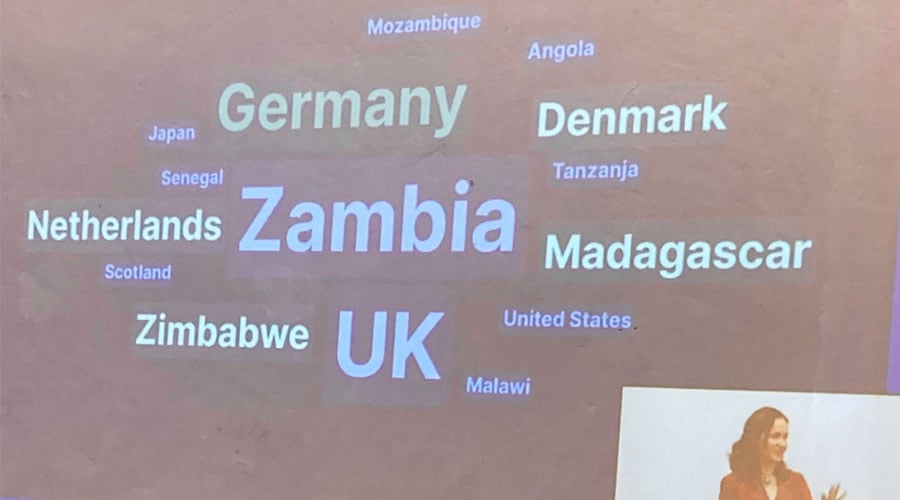
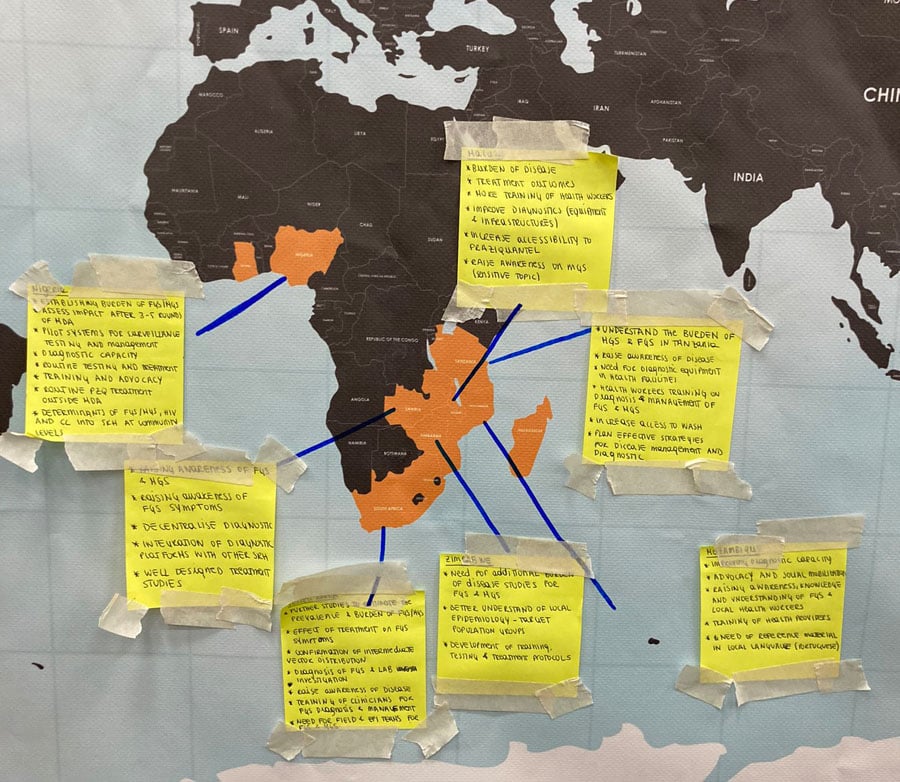
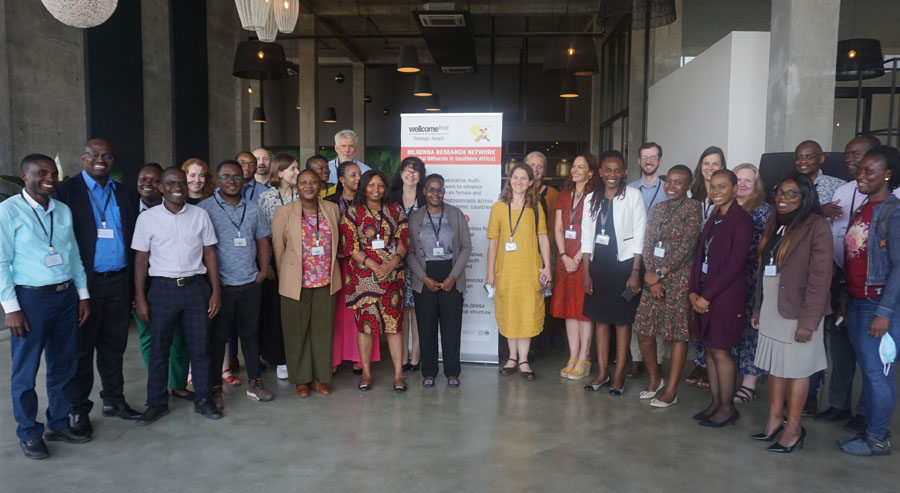
We celebrated the work of our team of midwives - Alice, Agness, Kaziku and Mercy and a blog from our wonderful midwife - sister Kaziku posted at the MARCH Centre.
Our study manager Dr. Nanyangwe Siuluta and our Schista Community Worker Ruth Mwansa presented at the ISNTD panel discussion on International Women's Day integrating FGS into the Health System
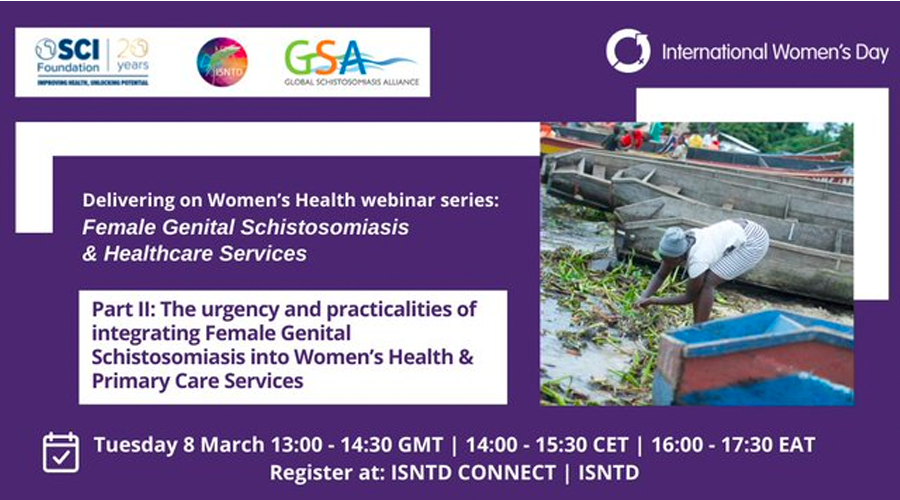
The Schista study started recruitment on January 19th. Our teams are in the field going door to door recruiting participants and implementing self-sampling through their 'mini' portable laboratories.
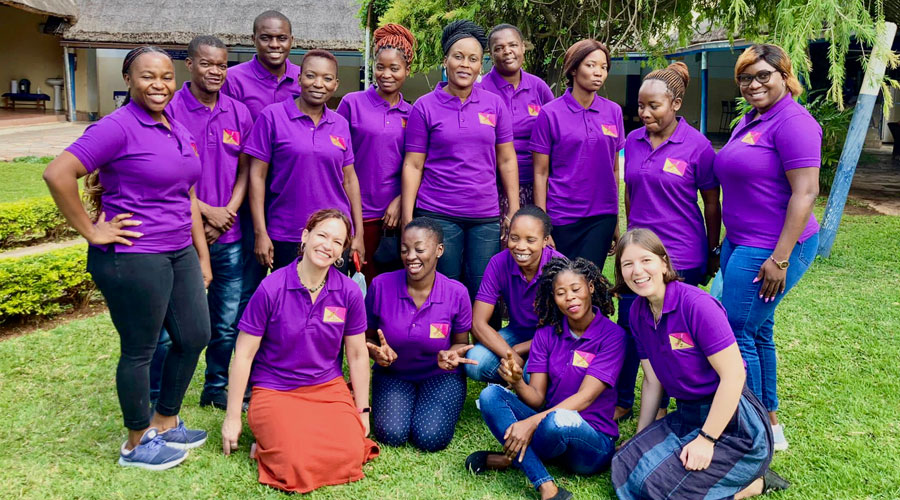
On August 31st the Schista! study was officially launched. District Health Officers from Kafue, Chongwe and Livingstone and NTD officers from the Ministry of Health attended the virtual event.
Amaya Bustinduy, PI of the Zipime Weka Schista project was awarded the Future Leaders Fellowship to conduct the work. Read more about the award.
Recent updates
The Zipime Weka Schista! study team recently gathered in Lusaka for an intensive two-day refresher training in preparation for the second follow-up phase.
